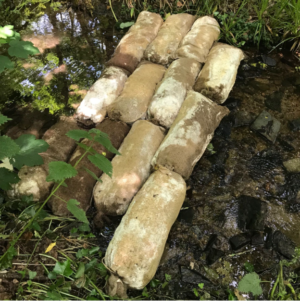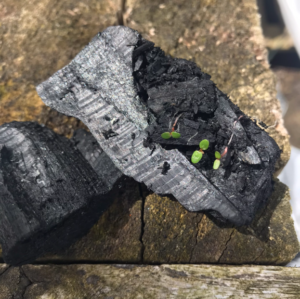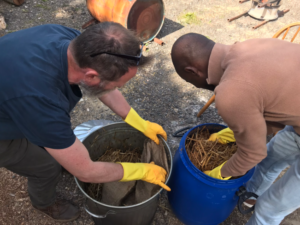
Grants
Landscape Regeneration
Flete Field Lab
£19,570 awarded
An innovative soil remediation project that aims to rewild soil and restore water quality on the Flete Estate using mycelium and biochar developed from local materials, discovering low-tech solutions to enhance soil and water quality that can be shared widely in Devon, UK, & beyond.
This is an exciting collaboration between Flete Field Lab CIC, a new Devon-based social enterprise, Exeter University’s Global Systems Institute, Plymouth University’s Sustainable Earth Institute, West Country Rivers Trust, South Devon AONB, and the Flete Estate.
“On land, all life springs from soil. Soil is ecological currency. If we overspend it or deplete it, the environment goes bankrupt… Mycorestoration is the use of fungi to repair or restore the weakened immune systems of environments.” – Paul Stamets, Mycelium Running
About our Flete Field Lab project:
Microscopic mycelium and microbes underpin the health of our soil, and in turn the health of our waterways and life itself.
Flete Field Lab aims to rewild soil and restore water quality on the Flete Estate using mycofiltration and biochar made from local materials to develop low-tech solutions that can be shared widely in the UK and beyond.
The Flete Estate runs either side of the Erme Estuary, with ancient woodlands and diverse wildlife that have secured it’s SSSI status. But there are issues with agricultural run-off, soil depletion and other human interventions that have a negative impact on both the soil and water quality and therefore the wider environment.
Under the Environment Agency, the Erme operational catchment is made up of 7 waterbodies, only one of which is classified (as of 2019) as “Good” for Ecological Status. All seven of them fail Chemical Status and the overwhelming reasons for these failures are due to agricultural land management and the water industry.
This project aims to restore soils and improve water quality by mitigating and attenuating agricultural runoff using a combination of mycofiltration and biochar on pasture fields.
DEF funding will enable the project leaders to build a network of stakeholders, create a core team of scientists and specialists, set up a small field lab on the estate, and deliver two field trials.
The key objectives of the project are:
- Enhance soil ecology and improve water quality
- Soil carbon sequestration
- Attenuate flow and surface run-off, benefit drainage management
- Sediment Management
- Pollutant reduction
- Habitat Creation (micro and macro)
- Encourage sustainable and regenerative farming practices with evidence
‘‘Mycofiltration is a new approach which uses fungi as a biological filter to remove persistent contaminants from both water and soil. Scientific studies have demonstrated how some species of fungi – like gourmet Oyster mushrooms – can digest pollutants like petrochemicals or bacteria, whilst others can remove and store heavy metals from the environment.” (Project Centre)
The biochar will be made by turning wood from Flete estate’s normal woodland management processes into biochar – discovering the best methods and designing a mobile biochar unit to help other Devon landowners/farmers apply local, circular, low impact practices to improve their soil and sequester carbon.
The research and intervention methods will be open source, meaning that we will freely share the ‘recipes’ that we discover are most effective for water and soil restoration projects taking place anywhere in Devon, and beyond!
* This project was enabled thanks to a generous donation from the Devon Community Foundation providing co-funding of £5,000.
UPDATE Summer 2022: Thanks to the generous support of two of our partners, Vivobarefoot and Olympus Power, we have increased our grant to this project by a further £10,000 and purchased a larger biochar kiln so they can scale up production. We look forward to seeing how this helps them scale up to the next level.
UPDATE Autumn 2022: Flete Field Lab delivered the only known successful mycofiltration trial in the UK, using mycelium-infused sacks and leaky dams to clean toxins downstream from a sewage treatment plant. The experiments saw a reduction in Ecoli of 47% and falls in levels of chemical pollutants too. 2023 trials will target phosphates, so watch this space!
Mini impact update for Mycelium.
Mini impact update for Biochar.
See our 1 min film about Flete Field Lab HERE.



